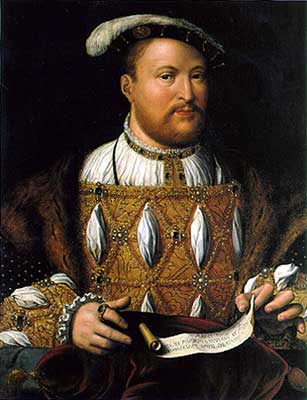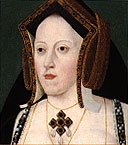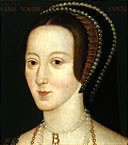|
|
|
|
|
|
|
|
|
|
|
|
|
|
|
|
|
|
|
|
|
|
|
|
|
|
|
|
|
|
|
|
|
 |
|
|
|
|
|
|
|
|
|
|
|
|
|
|
|
|
|
|
|
|
|
|
|
|
|
|
|
 |
|
|
|
|
|
|
|
Henry
VIII inherited a firm throne and a full treasury at the death of his father,
Henry VII. However, over the course of his reign he managed to convert his overflowing
coffers into enormous debt and to add to that, the Tudor dynasty desperately
needed a male heir in order to stave off any dynastic problems that could occur
in the wake of the War of the Roses. One of his first acts as king was to marry
his brother Arthur's widow, the popular Catherine of Aragon, by acquiring a
papal dispensation on the grounds that the marriage was not consummated. The
marriage with Catherine had produced six children but only one sickly daughter,
Mary, survived infancy. Eventually, it became clear
that Catherine was unlikely to produce further children. |
|
|
|
|
|
|
|
|
|
Henry
VIII as the Evangelical King, c. 1535.
Attributed to Joos van Cleve. |
|
|
|
|
|
|
|
|
|
|
In
the early years of the sixteenth century, this issue of succession motivated
the Reformation. Henry's only remedy was to dissolve his marriage and wed again.
Henry's desire for Anne Boleyn, coupled with his need to produce a legitimate
male heir, required he divorce his current wife. When the papacy refused to
grant his annulment, Henry proposed his own legislation and utilized divine
law as revealed in the word of God to justify his divorce. Biblical passages
such as Leviticus 18:16 which states, "You shall not have intercourse with
your brother's wife: that is to bring shame upon him." and Leviticus 20:21
that says that "If a man takes his brother's wife, it is impurity. He has
brought shame upon his brother; they shall be proscribed." This was seen
as a denouncement of marriage between a man and his deceased brother's wife.
Because the belief that such a union would produce no children, the king saw
this as an explanation for his predicament. However, his problems with Rome
continued, raising questions over the nature of papal jurisdiction over the
king. By 1534 the emergence of an unprecedented doctrine, named The Act of Supremacy,
called for the king to assume the role of head of the new Church
of England. Henry's Reformation Parliament confirmed his title as "of
the Church of England on Earth Supreme Head" and editions of the new English
translation of the Bible were ordered to be placed in every church. |
|
|
|
|
|
|
|
|
|
|
|
|
|
|
|
|
|
|
|
|
 |
|
|
|
|
|
|
|
|
|
|
|
Catherine
of Aragon |
|
|
|
|
|
|
|
|
|
|
|
 |
|
|
|
|
|
|
|
|
|
|
|
|
|
|
|
|
|
|
|
|
|
|
|
 |
|
|
|
|
|
This
royal supremacy gave Henry VIII the power and duty before God to advance the
true religion within his realm and declare his independence from Rome. Prior
to the Act of Supression, the church had incurred tremendous amounts of suspicion
and jealousy amongst the laity. The church and its religious officials were
viewed as wealthy, indolent and utterly removed from their spiritual roots as
well as the public that they were expected to minister. With the expansion of
his authority and power, Henry VIII and his ministers reduced the church to
political subserviency. However, at this early point in the Reformation, little
else had changed. The mass was still conducted in
Latin and other traditional ceremonies had been retained. Any further aims and
actions undertaken by the monarchy were integrally related to the extension
of royal power and made Henry one of the most powerful king that Britain had
ever known. |
|
|
|
|
|
|
|
|
|
|
|
|
|
Anne
Boleyn |
|
|
|
|
|
|
|
|
 |
|
|
|
|
|
|
|
|
|
|
|
|
|
|
|
|
|
|
|
|
|
|
|
|
|
|
|
|
|
|
 |
|
|
|
|
|
|
|
|
|
|
|
|
|
 |
|
|
|
|
|
|
|
|
|
|
|
|
|
|
|
|
|
|
 |
 |
 |
 |
 |
 |
 |
 |
 |
 |
 |
 |
 |
 |
 |
 |
 |
 |
 |
 |
 |
 |
 |
 |
 |
 |
 |
 |
 |







